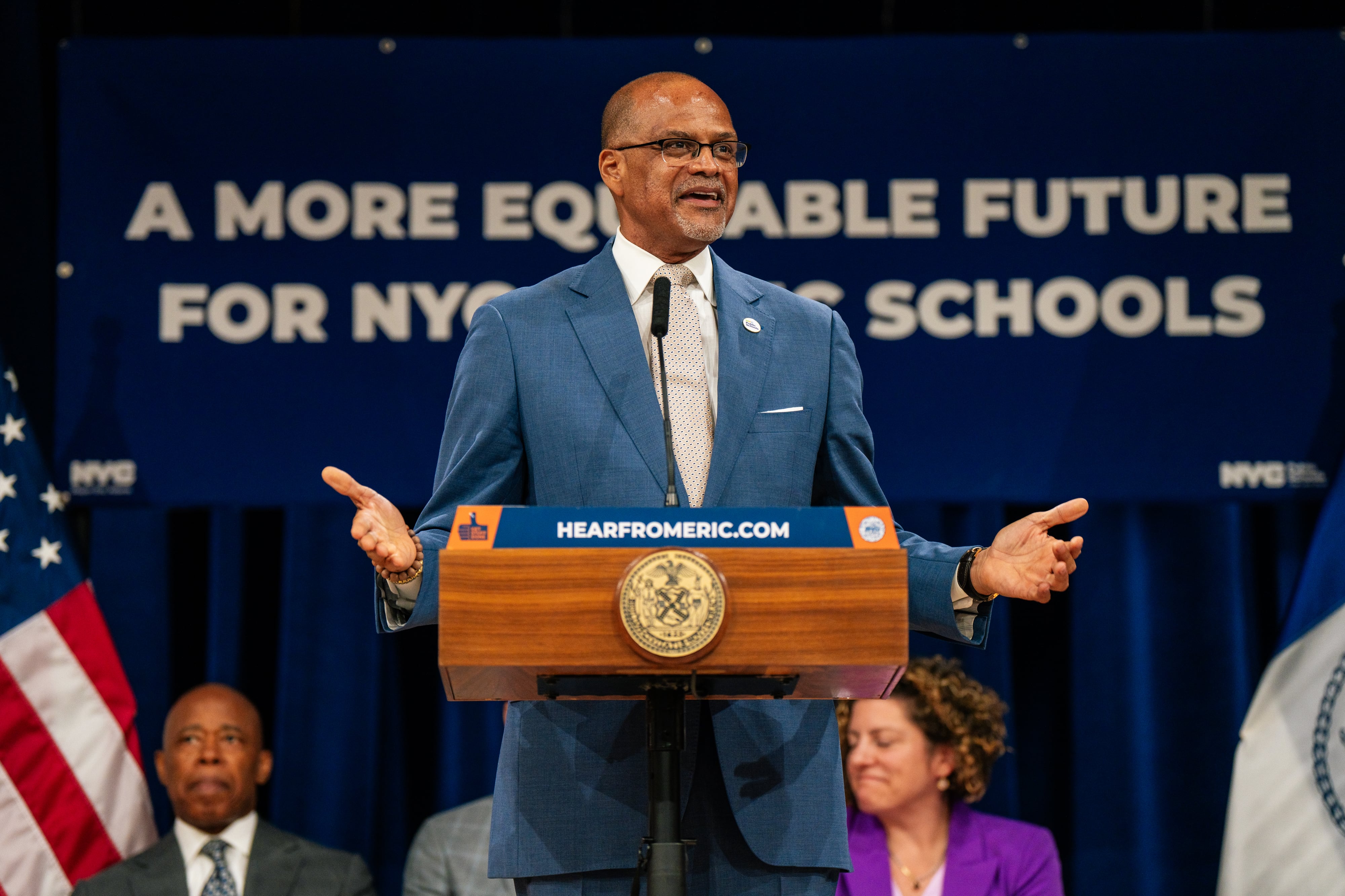Sign up for Chalkbeat New York’s free daily newsletter to get essential news about NYC’s public schools delivered to your inbox.
Former New York City Chancellor David Banks on Friday urged Mayor Eric Adams to take “decisive action this year” on a systemwide school cellphone ban, in some of his first public comments since his abrupt exit last October.
“As Chancellor, this was one of the initiatives I deeply believed in,” Banks wrote on LinkedIn Friday, referring to a New York Daily News op-ed entitled “Ban smartphones in public schools.”
“While Mayor Adams decided to take more time to consider this policy, I hope that we see decisive action this year,” Banks continued.
Banks’ comments Friday were his clearest effort yet to distance himself from the decision to not move forward with a systemwide school cellphone ban this school year.
Adams put the kibosh on that proposal last August after Banks spent months hinting about an imminent plan. Disagreement over the cellphone ban was reportedly part of a growing rift between the longtime friends in the final months of the school chief’s two-and-a-half year tenure. Banks departed in dramatic fashion last October amid escalating federal investigations into Adams’ inner circle.
Banks’ push also comes as conversations about school cellphone bans are heating up again in Albany. Gov. Kathy Hochul has repeatedly expressed her concerns about the role of phones in schools and is mulling issuing statewide policy in the coming weeks.
Adams said in a press conference last month that the city would comply with state policy.
The idea of a systemwide school cellphone ban in the nation’s largest school district gathered significant momentum last school year in a matter of months.
Banks expressed skepticism about the idea as recently as last March, but quickly became an ardent supporter. Banks credited the book “The Anxious Generation” by NYU professor and New York City public school parent Jonathan Haidt and conversations with school principals for changing his mind.
“The evidence is clear,” Banks said Friday on LinkedIn. “Limiting phone use in schools improves safety, reduces distractions, and addresses the growing mental health challenges our children face, including online bullying.”
Roughly 90% of schools across the country reported incidents of cyberbullying last school year, according to federal education department survey data.
Banks signaled early last summer that he intended to implement a systemwide ban starting this school year.
But Adams threw cold water on that idea in late August, saying the city was “not there yet” and that he didn’t want to introduce a policy he would later have to roll back. “We want to make sure we have parents on board,” Adams said.
Education Department officials ultimately encouraged schools to consider cellphone bans but didn’t mandate it. Officials said at the start of the school year that they expected some 850 of the city’s roughly 1,600 schools to have a ban in place this year.
Education officials also said they planned to work with the Health Department this school year to study the best practices for cellphone use in schools. A spokesperson told Chalkbeat that study is underway but didn’t share any findings or say when it will be done.
A spokesperson for Adams didn’t immediately respond to questions Friday about Banks’ comments or the city’s plans for school cellphone policy.
Less than two weeks after Adams announced he was pumping the brakes on the school cell phone ban, federal officials searched the home of Banks and his wife, former First Deputy Mayor Sheena Wright. Investigators were reportedly looking into whether Banks’ brother Terence improperly leveraged his family relationships to try to secure city contracts for clients of his consulting firm. Soon after, Adams was charged with violating federal bribery and campaign finance laws as part of a separate investigation. Neither Banks nor Wright have been accused of wrongdoing.
Banks announced his retirement in late September, saying he had been planning to step down for months and denying that the decision had anything to do with the investigations.
He initially planned to stay in his position through the end of December, but Adams accelerated that timeline amid an effort to demonstrate to Hochul, who has the power to remove the mayor, that he could continue governing. That prompted a critical statement from Banks, who said the earlier departure date undercut his ability to conduct a “responsible transition for our staff.”
Banks didn’t respond Friday to a request for comment.
Michael Elsen-Rooney is a reporter for Chalkbeat New York, covering NYC public schools. Contact Michael at melsen-rooney@chalkbeat.org






